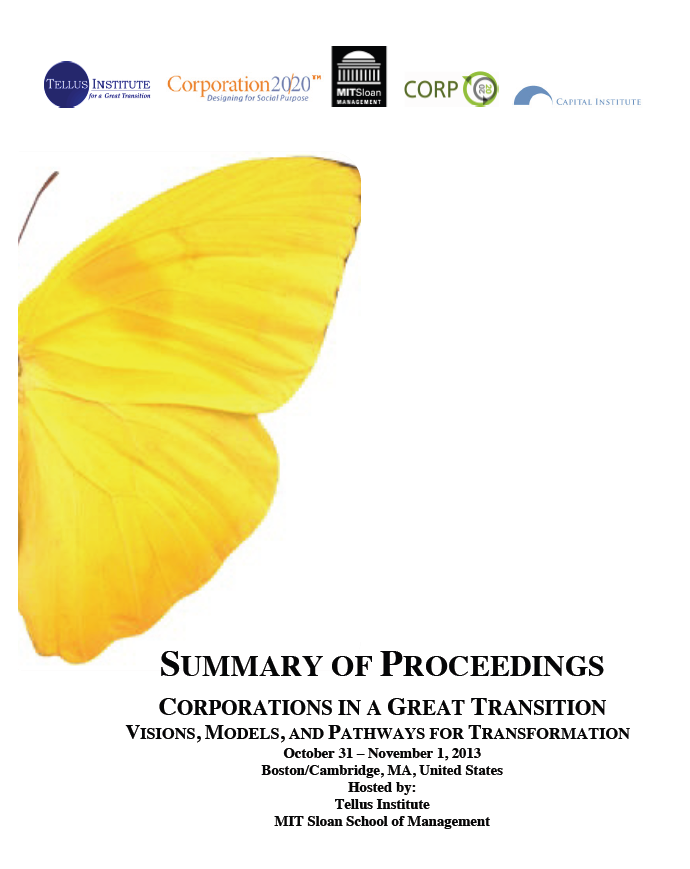FALL 2012 LUNCH SEMINAR SERIESWednesday, October 17, 2012 Wednesday, October 24, 2012 Wednesday, October 31, 2012 Monday, January 28, 2013 FALL 2010 LUNCH SEMINAR SERIESThe Corporation 20/20 Fall 2010 lunch seminar series marked the fifth anniversary of the release of the Corporation 20/20 six Principles of Corporate Design. Below are the brief descriptions of the first three seminars which took place at the Tellus Institute in Boston. Thursday, September 23.What is the âproperâ purpose of the corporation? A transnational comparison Roy Shapira, Doctoral Student, Harvard Law School and Lecturer, Department of Economics, Harvard University. Former Associate at an Israeli law firm specializing in corporate litigation; Lecturer, Property Law at the Interdisciplinary Center (Israel) Summary: Corporation 20/20 Principle 1 defines the purpose of the corporation as harnessing private interests to serve the public interest. The question of corporate purpose is seldom asked yet lies at the heart of societal expectations, contemporary corporate conduct, and prospects for innovative corporate designs in the coming decades. New research reveals different answers across countries and over time. Each definition affects the scope of managerial fiduciary duties, regulating takeovers, mandating employee representation, disclosure requirements, and the requirements and revocation mechanisms for granting incorporation charters. The common wisdom that used to divide the world into the Anglo-Saxon shareholder-oriented approach and the Continental Europe stakeholder-oriented approach is overly simplistic and should not be accepted at face value. New developments in US state charter law open new possibilities for repurposing the corporation. ___________________________________________ Wednesday, October 13What is an accountable corporation in the 21st century? Alan Willis, Advisor to Canadian Institute of Chartered Accountants (CICA), author of background papers for Canada's National Round Table on the Environment and the Economy Task Force on Capital Markets and Sustainability, and co-author of a CICA report on the business and climate change (); and Discussant James Post, John F. Smith Professor of Management, Boston University, Co-Author, Redefining the Corporation. Summary: Corporation 20/20 Principle 5 calls for corporations to be governed in a manner that is participatory, transparent, ethical, and accountable. Accountability is a dynamic concept, evolving as societal expectations of business change in response to 21st century needs and expectations. It is manifested in governance, stakeholder relations, and the organizationâs commitment to transparency and ethical conduct. In the coming years, to what norms of accountability should corporations be held, and what are the leading examples of organizations whose practices provide a glimpse of the frontier in corporate accountability? ___________________________________________ Thursday, October 21What is a âfairâ return to investors?
|
Key RESOURCES
|
 |
SUMMARY OF PROCEEDINGS
October 31 - November 1, 2013 Roundtable event Summary of Proceedings |
Video Interview with Allen White at Yale Univ.
| |
Redesigning Finance: Pathway To A Resilient Future
| |
2nd Summit Resources
 |
SECOND SUMMIT PAPER SERIES
A collection of 8 papers exploring key components of corporate design |
SECOND SUMMIT SUMMARY OF PROCEEDINGS
|
1st Summit Resources
 |
FIRST SUMMIT VIDEO
A one hour video summary of the Summit on the Future of the Corporation. |
 |
FIRST SUMMIT PAPER SERIES
A collection of 10 papers exploring key components of corporate design |
FIRST SUMMIT SUMMARY OF PROCEEDINGS
|


 Corporations in a Great Transition
Corporations in a Great Transition